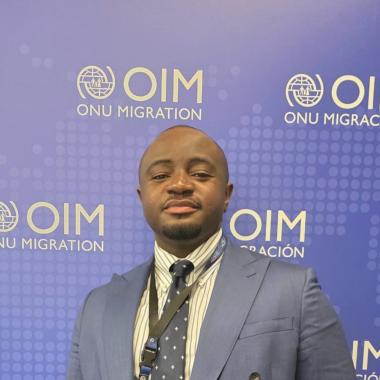
Why study here?
Where better to study politics and international relations than a truly global city? Recognised internationally for our teaching and expertise in Politics and International Relations, we’re home to a diverse student body and welcoming community. You’ll be taught by active researchers, including those from our renowned Centre for the Study of Democracy, and be able to enhance your experience by getting involved in the Democratic Education Network.
Courses
2026/27 Full-time
- Arabic and International Relations BA Honours
- Chinese and International Relations BA Honours
- Culture, Environment and Social Change BA Honours
- French and International Relations BA Honours
- History and Politics BA Honours
- International Relations and Development BA Honours
- International Relations and Development with Foundation BA Honours
- International Relations BA Honours
- International Relations with Foundation BA Honours
- Law and International Relations LLB Honours
- Politics and International Relations BA Honours
- Politics and International Relations with Foundation BA Honours
- Politics BA Honours
- Politics with Foundation BA Honours
- Spanish and International Relations BA Honours
2026/27 Full-time
- Diplomacy and Global Politics MA
- Diplomacy and Global Politics MA (January)
- Global Development MA
- Global Development MA (January)
- International Relations and Democratic Politics MA
- International Relations and Democratic Politics MA (January)
- International Relations and Security MA
- International Relations and Security MA (January)
- International Relations MA
- International Relations MA (January)
- Public Policy and Management MA
- Public Policy and Management MA (January)
2026/27 Part-time day
- Diplomacy and Global Politics MA
- Diplomacy and Global Politics MA (January)
- Global Development MA
- Global Development MA (January)
- International Relations and Democratic Politics MA
- International Relations and Democratic Politics MA (January)
- International Relations and Security MA
- International Relations and Security MA (January)
- International Relations MA
- International Relations MA (January)
- Public Policy and Management MA
- Public Policy and Management MA (January)
Known for our combination of pure, practice-led and applied approaches, and for using our knowledge for the betterment of society, we offer PhD, MPhil, DProf and MRes study. We can provide you with guidance on how to write your research proposal and our entry requirements for a Research Degree.
2026/27 Full-time
- Arabic and International Relations BA Honours
- Chinese and International Relations BA Honours
- Culture, Environment and Social Change BA Honours
- French and International Relations BA Honours
- History and Politics BA Honours
- International Relations and Development BA Honours
- International Relations and Development with Foundation BA Honours
- International Relations BA Honours
- International Relations with Foundation BA Honours
- Law and International Relations LLB Honours
- Politics and International Relations BA Honours
- Politics and International Relations with Foundation BA Honours
- Politics BA Honours
- Politics with Foundation BA Honours
- Spanish and International Relations BA Honours
2026/27 Full-time
- Diplomacy and Global Politics MA
- Diplomacy and Global Politics MA (January)
- Global Development MA
- Global Development MA (January)
- International Relations and Democratic Politics MA
- International Relations and Democratic Politics MA (January)
- International Relations and Security MA
- International Relations and Security MA (January)
- International Relations MA
- International Relations MA (January)
- Public Policy and Management MA
- Public Policy and Management MA (January)
2026/27 Part-time day
- Diplomacy and Global Politics MA
- Diplomacy and Global Politics MA (January)
- Global Development MA
- Global Development MA (January)
- International Relations and Democratic Politics MA
- International Relations and Democratic Politics MA (January)
- International Relations and Security MA
- International Relations and Security MA (January)
- International Relations MA
- International Relations MA (January)
- Public Policy and Management MA
- Public Policy and Management MA (January)
Known for our combination of pure, practice-led and applied approaches, and for using our knowledge for the betterment of society, we offer PhD, MPhil, DProf and MRes study. We can provide you with guidance on how to write your research proposal and our entry requirements for a Research Degree.
Next open days
Careers
Industry links
Our staff are active researchers bringing their knowledge and expertise into their teaching on our courses. We regularly invite external speakers to take part in our well-established series of seminars, public lectures and conferences. Our teaching team has links with international organisations, NGOs and think tanks, as well as international research networks.
Job roles
Our students graduate with a well-rounded skills base and can go on to work in roles such as:
- Diplomat
- Journalist
- Policy analyst
- Civil servant
- Researcher
- Teacher
- NGO worker
- Media officer
ZONE29: OUR NEW HOME OF CAREERS AND ENTERPRISE
Our doors are set to open in spring 2026, but a wide range of opportunities are available now, including:
- jobs, placements and work experience
- tailored career guidance and mentoring
- career planning through the Westminster Award
- work and study abroad programmes
- help with developing your own business or freelancing
Westminster stories
Westminster explores realities of war in Ukraine through art and dialogue
We hosted a panel discussion examining the war and its global impact.
International Relations students visit Brussels
On a three-day trip , students visited a variety of European Union (EU) institutions and the NATO headquarters.
Westminster students visit EU delegation to learn about EU-UK relationship
University of Westminster students visited the EU Delegation to the UK for a talk about the EU-UK relationship and the on-going war in Ukraine.
Chat with our students
Ask some of our current students about their experience of life at the University of Westminster.
What our students say

Riya Modi
International Relations MA - 2026
Studying International Relations at Westminster feels like being handed a backstage pass to the global theatre - complete with climate change debates, energy diplomacy drama, and decolonial plot twists.

Jean Charles Munongo
Diplomacy and Global Politics MA - 2025
The Diplomacy and Global Politics MA gave me practical diplomatic experience, incredible academic support, and opportunities that led me to the United Nations. Westminster empowers students to grow, gain confidence, and turn ambition into real career pathways.

Jon Woodburn
BA History and Politics and WWC Mumbai - 2019
Senior Caseworker | House of Commons
Being one of the most diverse universities is something which attracted me as I wanted to experience different cultures and broaden my horizons. Studying History and Politics at Westminster was the best combination possible, as all the resources needed from Parliament, to the British Library and Museum were within walking distance from my campus.
Video gallery
Related pages
Contact us
Contact our Course Enquiries Team:
Opening hours: 10am–4pm Monday to Friday






